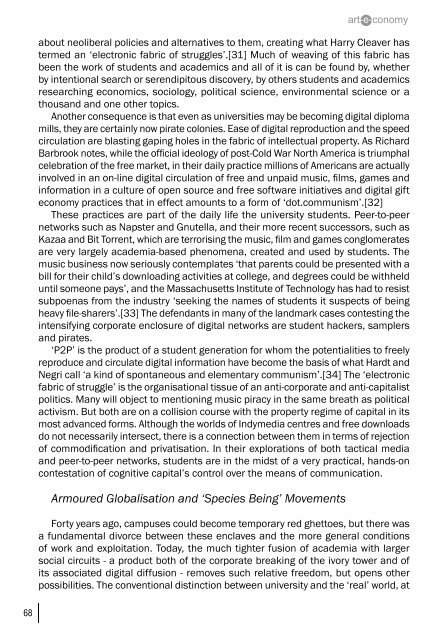art-e-conomy _ reader - marko stamenkovic
art-e-conomy _ reader - marko stamenkovic
art-e-conomy _ reader - marko stamenkovic
You also want an ePaper? Increase the reach of your titles
YUMPU automatically turns print PDFs into web optimized ePapers that Google loves.
68<br />
about neoliberal policies and alternatives to them, creating what Harry Cleaver has<br />
termed an ‘electronic fabric of struggles’.[31] Much of weaving of this fabric has<br />
been the work of students and academics and all of it is can be found by, whether<br />
by intentional search or serendipitous discovery, by others students and academics<br />
researching economics, sociology, political science, environmental science or a<br />
thousand and one other topics.<br />
Another consequence is that even as universities may be becoming digital diploma<br />
mills, they are certainly now pirate colonies. Ease of digital reproduction and the speed<br />
circulation are blasting gaping holes in the fabric of intellectual property. As Richard<br />
Barbrook notes, while the official ideology of post-Cold War North America is triumphal<br />
celebration of the free market, in their daily practice millions of Americans are actually<br />
involved in an on-line digital circulation of free and unpaid music, films, games and<br />
information in a culture of open source and free software initiatives and digital gift<br />
e<strong>conomy</strong> practices that in effect amounts to a form of ‘dot.communism’.[32]<br />
These practices are p<strong>art</strong> of the daily life the university students. Peer-to-peer<br />
networks such as Napster and Gnutella, and their more recent successors, such as<br />
Kazaa and Bit Torrent, which are terrorising the music, film and games conglomerates<br />
are very largely academia-based phenomena, created and used by students. The<br />
music business now seriously contemplates ‘that parents could be presented with a<br />
bill for their child’s downloading activities at college, and degrees could be withheld<br />
until someone pays’, and the Massachusetts Institute of Technology has had to resist<br />
subpoenas from the industry ‘seeking the names of students it suspects of being<br />
heavy file-sharers’.[33] The defendants in many of the landmark cases contesting the<br />
intensifying corporate enclosure of digital networks are student hackers, samplers<br />
and pirates.<br />
‘P2P’ is the product of a student generation for whom the potentialities to freely<br />
reproduce and circulate digital information have become the basis of what Hardt and<br />
Negri call ‘a kind of spontaneous and elementary communism’.[34] The ‘electronic<br />
fabric of struggle’ is the organisational tissue of an anti-corporate and anti-capitalist<br />
politics. Many will object to mentioning music piracy in the same breath as political<br />
activism. But both are on a collision course with the property regime of capital in its<br />
most advanced forms. Although the worlds of Indymedia centres and free downloads<br />
do not necessarily intersect, there is a connection between them in terms of rejection<br />
of commodification and privatisation. In their explorations of both tactical media<br />
and peer-to-peer networks, students are in the midst of a very practical, hands-on<br />
contestation of cognitive capital’s control over the means of communication.<br />
Armoured Globalisation and ‘Species Being’ Movements<br />
Forty years ago, campuses could become temporary red ghettoes, but there was<br />
a fundamental divorce between these enclaves and the more general conditions<br />
of work and exploitation. Today, the much tighter fusion of academia with larger<br />
social circuits - a product both of the corporate breaking of the ivory tower and of<br />
its associated digital diffusion - removes such relative freedom, but opens other<br />
possibilities. The conventional distinction between university and the ‘real’ world, at


